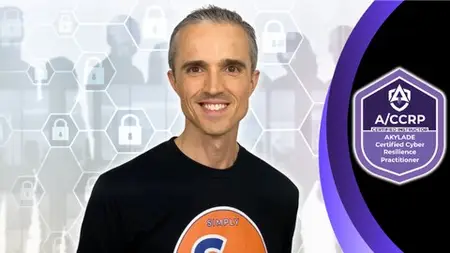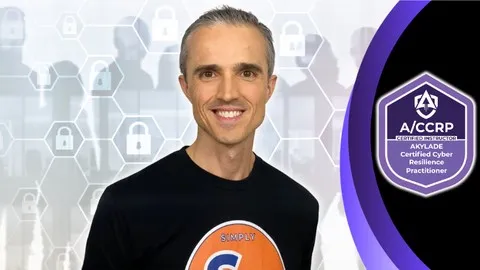Nist Csf 2.0 Akylade Certified Cyber Resilience Practitioner
Published 11/2024
MP4 | Video: h264, 1920x1080 | Audio: AAC, 44.1 KHz
Language: English | Size: 11.13 GB | Duration: 8h 33m
Published 11/2024
MP4 | Video: h264, 1920x1080 | Audio: AAC, 44.1 KHz
Language: English | Size: 11.13 GB | Duration: 8h 33m
A/CCRP: Get ready to lead the team or be an independent consultant!
What you'll learn
Implementation Expertise: Gain practical expertise in planning, implementing, managing, and optimizing the NIST Cybersecurity Framework
Risk Profile Coordination: Learn how to coordinate with key stakeholders and management to gain organization-wide support and establish risk profiles
Cybersecurity Risk Prioritization: Master rigorous methods for identifying and prioritizing top cybersecurity risks for efficient resource allocation
Personalized Risk Management: Acquire skills to develop a tailored and effective cybersecurity risk management strategy
Risk Posture Maintenance: Understand the processes involved in regularly updating and maintaining an organization’s cybersecurity risk posture
Continuous Improvement: Discover methods to drive continuous improvement in cyber resilience practices,
Requirements
A basic understanding of cybersecurity principles is recommended
This course builds on AKYLADE Certified Cyber Resilience Fundamentals (A/CCRF)
Description
Master the NIST Cybersecurity Framework and elevate your cybersecurity careerABOUT THE EXAMThe AKYLADE Certified Cyber Resilience Practitioner (A/CCRP) certification is designed to test your practical knowledge of the NIST Cybersecurity Framework (CSF) and how to plan, implement, manage, and optimize the material aspects of the framework for use within your own organization using a management action plan to:Exam ObjectivesCoordinate with management for organizational buy-in and establishing risk profiles for organizationsDiscover top organizational cybersecurity risks using rigorous prioritization methodsCreate a personalized cybersecurity risk management strategy tailored to an organization's unique requirementsConduct maintenance and updates to the organization's cybersecurity risk posture and perform continuous improvementWHAT SKILLS WILL YOU LEARN?Implementation ExpertiseGain practical expertise in planning, implementing, managing, and optimizing the NIST Cybersecurity Framework within your organization using a management action plan.Risk Profile CoordinationLearn how to coordinate with key stakeholders and management to gain organization-wide support and establish risk profiles specific to meet organizational requirements.Cybersecurity Risk PrioritizationMaster rigorous methods for identifying and prioritizing top cybersecurity risks to ensure efficient resource allocation within the organization.Personalized Risk ManagementAcquire skills to develop a tailored and effective cybersecurity risk management strategy that aligns with an organization’s unique needs.Risk Posture MaintenanceUnderstand the processes involved in regularly updating and maintaining an organization’s cybersecurity risk posture to adapt to evolving threats and risks.Continuous ImprovementDiscover methods to drive continuous improvement in cyber resilience practices, optimize response capabilities, and improve overall security posture.A/CCRP CERTIFICATION DOMAINSDomain 1: Management Action Plan FundamentalsPrepare for assessments, comprehend a management action plan process, achieve management buy-in, and understand the relationship between NIST Cybersecurity Framework and a management action plan processDomain 2: Phase One: Determine Top Cyber RisksIdentify, understand, assess, and present cyber risks using interviews, network diagrams, and custom questionnaires while setting NIST CSF alignment targetsDomain 3: Phase Two: Creating a Management Action PlanEvaluate and rate risk mitigation, create custom strategies, estimate costs, and develop an implementation roadmap for an organizationDomain 4: Phase Three: Maintenance and UpdatesGuide organizational leadership in allocating risk mitigation strategies, updating risk presentations, clarifying proposed measures, and conducting ongoing cybersecurity resilience review
Overview
Section 1: Introduction
Lecture 1 Welcome to the Course!
Lecture 2 Download Exam Objectives and Study Notes
Lecture 3 What to Expect on Exam Day and How to CRUSH It
Section 2: Chapter 11: The CR-MAP Process
Lecture 4 11.1 Introduction & Exam Objectives
Lecture 5 11.2 The CR-MAP Process - Featuring Dr. Gerald Auger!
Lecture 6 11.3 CR-MAP Process Phase 1 Primer: Discover Your Top Cyber Risks
Lecture 7 11.4 CR-MAP Process Phase 2 Primer: Create Your Action Plan
Lecture 8 11.5 CR-MAP Process Phase 3 Primer: Maintenance and Updates
Lecture 9 11.6 The Five Questions
Lecture 10 11.7 Fostering Security Culture
Lecture 11 11.8 Attorney-Client Privilege
Lecture 12 11.9 Conclusion and Touchpoints
Section 3: Chapter 12 - Phase 1: Discovering Top Cyber Risks
Lecture 13 12.1 Introduction & Exam Objectives
Lecture 14 12.2 Be a Compass for Risk Decisions
Lecture 15 12.3 Step 1: Widen Your Scope - Part 1 Featuring Dr. Gerald Auger!
Lecture 16 12.4 Step 1: Widen Your Scope - Part 2
Lecture 17 12.5 Step 2: Get Buy In, "Winning Heards and Minds"
Lecture 18 12.6 Step 3: Select Interviewees
Lecture 19 12.7 Step 4: Generate the Questionnaire
Lecture 20 12.8 Step 4 Continued: Scoring Criteria and Question Count
Lecture 21 12.9 Spreadsheet Lab Series Explainer
Lecture 22 12.11 Spreadsheet Lab 1: Build a CSF 2.0 Profiles Template
Lecture 23 12.12 Spreadsheet Lab 2: Build Charts
Lecture 24 12.13 Spreadsheet Lab 3: Simply CYBERCON Workshop
Lecture 25 12.14 Step 5: Determine Target Scores - Featuring Dr. Gerald Auger!
Lecture 26 12.15 Step 5: Determine Target Scores - Examples
Lecture 27 12.16 Step 6: Conduct the Interviews
Lecture 28 12.17 Step 7: Compile and Average the Scores
Lecture 29 12.18 Step 8: Communicate Your Top 5 Cyber Risks
Lecture 30 12.19 Conclusion and Touchpoints
Section 4: Chapter 13 - Phase 2: Creating a CR-MAP
Lecture 31 13.1 Introduction & Exam Objectives - Featuring Simply Cyber Jaw Jacking
Lecture 32 13.2 Responsible Disclosure Case Study: ASUS Home Routers
Lecture 33 13.3 Responsible Disclosure: 6 More Business Case Studies
Lecture 34 13.4 Keys to Success: Prioritization, Roles and Responsibilities…
Lecture 35 13.5 Key Success Factors Continued: Controlling the Rate of Change
Lecture 36 13.6 Five Steps to Developing an Action Plan
Lecture 37 13.7 (Step 1) Close the Identified Gaps - Featuring Dr Gerald Auger!
Lecture 38 13.8 Backgrounder on Supply Chain Risk Management | GV.SC-01
Lecture 39 13.9 GV.SC Requirements to Address Cybersecurity Risks in Supply Chains
Lecture 40 13.10 AI Aigmented Contract Review - Fabric Demo
Lecture 41 13.11 GV.SC Supply Chain Risks Understood, Recorded, Prioritized, Assessed…
Lecture 42 13.12 GV.SC: Example Supply Chain Risk Assessment Tools
Lecture 43 13.13 PR.AA: Identity Management, Authentication, and Access Control - Featu
Lecture 44 13.14 PR.AT Awareness and Training
Lecture 45 13.15 RS.CO: Incident Response Reporting and Communication
Lecture 46 13.16 (Step 1) Considerations: Cybersecurity Org Size and Design
Lecture 47 13.17 3TCO: 3-Year Total Cost of Ownership - Featuring Jason Dion in Cyber Cof
Lecture 48 13.18-Part 1: (Step 2) Business Value Analysis - Featuring Jason Dion!
Lecture 49 13.18-Part 2: (Step 2) Business Value Analysis
Lecture 50 13.19 (Step 3) Create a Dashboard and Roadmap
Lecture 51 13.20 (Step 4) Internal Marketing Cyber Risk Scorecard Presentation
Lecture 52 13.21 Internal Marketing Key Success Factors
Lecture 53 13.22 (Step 5) External Marketing
Lecture 54 13.23 Conclusion & Touchpoints
Section 5: Chapter 14 - Phase 3: Maintenance and Updates
Lecture 55 14.1 Introduction & Exam Objectives
Lecture 56 14.2 Equifax Data Breach Case Study
Lecture 57 14.3 Four Steps
Lecture 58 14.4 AI Augmented NIST CSF Assessment - Fabric Demo
Lecture 59 14.5 Conclusion and Touchpoints
Section 6: AKYLADE Certified Cyber Resilience Practitioner (A/CCRP) [CRP-002]
Entry-level or mid-career professionals looking to launch or lift their career in Cybersecurity



